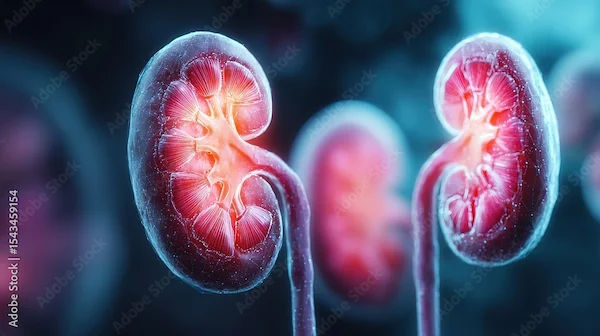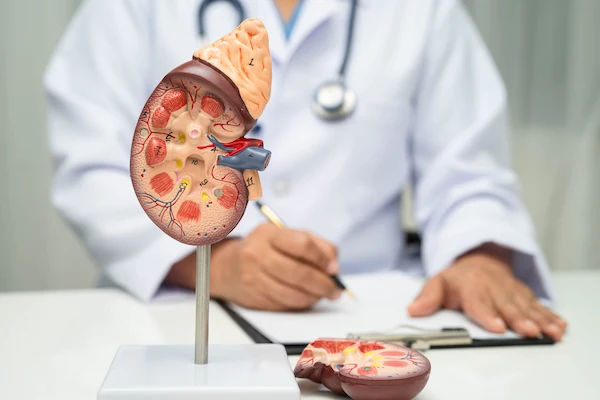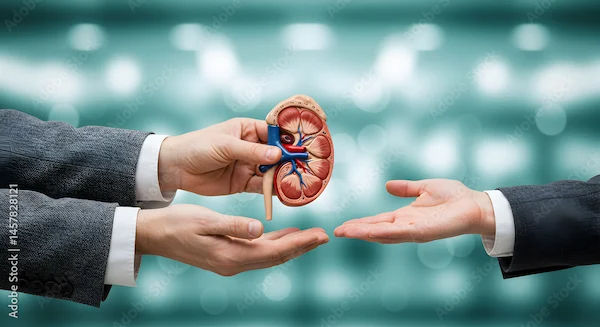Signs Of Chronic Kidney Disease: A Stage-by-Stage Guide
Discover the signs of chronic kidney disease (CKD) at each stage. Learn how symptoms progress from early subtle changes to advanced kidney failure, along with the causes, diagnosis, and treatment options.


Introduction
Chronic kidney disease (CKD) is often called a "silent killer" because its signs and symptoms are subtle and easily mistaken for other common ailments. By the time noticeable problems appear, significant, sometimes irreversible, kidney damage may have already occurred. Your kidneys are remarkable organs tasked with filtering waste, balancing fluids, and managing blood pressure. When they falter, your entire body feels the effects. This guide will walk you through the critical signs of chronic kidney disease, breaking them down by each of the five stages. Understanding these signals is your first and most powerful step toward timely diagnosis and effective management. Whether you're at risk or simply health-conscious, knowing what to look for can make all the difference.
What is Chronic Kidney Disease (CKD)?
Chronic kidney disease is a progressive condition characterised by the gradual loss of kidney function over months or years. Unlike acute kidney injury, which happens suddenly, CKD is a long-term deterioration. The primary measure of kidney function is the glomerular filtration rate (eGFR), which estimates how much blood your kidneys filter each minute. A diagnosis of CKD is typically given when reduced kidney function (eGFR < 60) and/or signs of kidney damage, like protein in the urine (proteinuria), persist for more than three months.
The Kidneys' Vital Role in Your Body
Think of your kidneys as your body's sophisticated filtration plant. Every day, they process about 200 quarts of blood to sift out about 2 quarts of waste products and extra water, which become urine. But their job doesn't stop there. They also:
Release hormones that regulate blood pressure.
Produce red blood cells by releasing erythropoietin.
Activate vitamin D for strong bones.
Maintain a crucial balance of minerals like sodium, potassium, and phosphorus in your blood.
When CKD disrupts these processes, it leads to a cascade of health issues throughout the body.
Consult Top Specialists for Personalised Tips
The 5 Stages of Chronic Kidney Disease
CKD is classified into five stages based on your eGFR. This staging helps doctors understand the severity of the disease and plan appropriate treatment.
Stage 1 CKD: Kidney Damage with Normal Function
eGFR Range and What It Means:
In Stage 1, your eGFR is a normal 90 or above. The "kidney damage" is identified through other evidence, most commonly proteinuria—the presence of protein (albumin) in the urine, which indicates the filters in the kidneys are damaged and leaking.
Early Warning Signs in Stage 1:
Symptoms are incredibly rare. The only sign might be slightly foamy urine or swelling in the hands and feet due to protein loss. Most people discover Stage 1 CKD during routine testing for other conditions, like diabetes or hypertension. This is the best time to intervene and slow progression.
Stage 2 CKD: Mild Loss of Kidney Function
eGFR Range and Progression:
An eGFR between 60 and 89 indicates mildly reduced kidney function. Like Stage 1, kidney damage must also be present (e.g., protein in urine) for a CKD diagnosis.
Signs and Symptoms to Watch For:
Symptoms remain subtle. You might experience no signs at all, or non-specific issues like fatigue, trouble sleeping, or a general feeling of being unwell. High blood pressure that becomes harder to control is a major red flag at this stage.
Stage 3 CKD: Moderate Kidney Damage
This is often the stage where symptoms become more apparent. It's divided into two sub-stages:
Breaking Down Stage 3a and Stage 3b:
Stage 3a: eGFR 45-59
Stage 3b: eGFR 30-44
The Symptoms That Become Hard to Ignore:
As waste builds up in the blood (a condition called uremia), symptoms become more pronounced:
Fatigue and weakness due to anemia (the kidneys aren't producing enough erythropoietin).
Swelling (edema) in the legs, ankles, feet, or around the eyes.
Changes in urination: urine may be foamy, dark, or you may urinate more or less frequently.
Pain in the lower back.
Skin that feels dry or itchy.
Stage 4 CKD: Severe Loss of Kidney Function
eGFR Range and Progression:
With an eGFR between 15 and 29, kidney function is severely reduced. This is a critical juncture for preparing for potential kidney failure.
Pronounced Symptoms and Complications:
All symptoms from earlier stages worsen, and new, serious complications can arise:
Cardiovascular disease risk skyrockets.
High blood pressure becomes increasingly difficult to manage.
Bone disease and nerve damage can occur.
Nausea, vomiting, and a metallic taste in the mouth are common due to waste buildup.
Loss of appetite.
Stage 5 CKD: Kidney Failure (End-Stage Renal Disease)
What End-Stage Renal Disease Means:
An eGFR below 15 indicates that the kidneys have lost nearly all ability to function. This is kidney failure, also known as end-stage renal disease (ESRD).
Critical Symptoms and Necessary Treatment:
Without treatment, waste and fluid levels become life-threatening. Symptoms include:
Severely reduced urine output or no urine at all.
Shortness of breath from fluid buildup in the lungs.
Severe nausea and confusion.
Treatment is essential and includes dialysis or a kidney transplant.
Beyond the Stages: Common Symptoms Across CKD
While stages help categorise, some symptoms are common threads throughout CKD's progression.
Fatigue and Trouble Concentrating
This is primarily caused by anemia—a shortage of red blood cells to carry oxygen to your brain and muscles.
Swelling (Edema) and Shortness of Breath
Damaged kidneys can't remove extra fluid and sodium, causing it to back up in your tissues (edema) and, in severe cases, your lungs (pulmonary edema), making it hard to breathe.
Changes in Urination and Blood Pressure
Foamy urine (protein), bloody urine (red blood cells), or changes in frequency are key indicators. Conversely, kidney disease can cause high blood pressure, and high blood pressure can further damage kidneys, creating a dangerous cycle.
What Causes Chronic Kidney Disease?
The two most common causes are:
Diabetes: High blood sugar damages the tiny blood vessels in the kidneys' filters.
High Blood Pressure: Uncontrolled hypertension can damage the blood vessels leading to and within the kidneys.
Other causes include: Glomerulonephritis (inflammation of the kidney filters), polycystic kidney disease (a genetic disorder), prolonged urinary tract obstructions, and recurrent kidney infections.
How is CKD Diagnosed? Key Tests to Know
Early diagnosis is crucial. If you have risk factors like diabetes or hypertension, regular screening is recommended. Two simple tests are used:
Blood Test for eGFR: Measures creatinine levels to estimate your filtration rate.
Urine Test for ACR (Albumin-to-Creatinine Ratio): Checks for the presence of albumin, a type of protein, in your urine.
If your symptoms or test results are concerning, consult a doctor online with Apollo24|7 for further evaluation and to discuss a management plan. Apollo24|7 offers convenient home collection for tests like creatinine and ACR, making monitoring your kidney health easier.
Conclusion
Understanding the signs of chronic kidney disease stages empowers you to be the primary advocate for your health. While the journey through CKD stages can seem daunting, remember that knowledge is your greatest asset. Catching the disease early, often before you even feel a single symptom, opens the door to highly effective treatments and lifestyle changes that can preserve your kidney function for years to come. If you recognise any of these signs in yourself or a loved one, especially if you have risk factors like diabetes or hypertension, do not dismiss them. Take the next step today. If you're experiencing persistent symptoms or have concerns about your kidney health, consult a doctor online with Apollo24|7 for a professional evaluation and personalised advice. Your kidneys work tirelessly for you; now is the time to return the favour.
Consult Top Nephrologist
Consult Top Specialists for Personalised Tips

Dr. Pardha Saradhi
Nephrologist
9 Years • MBBS, MD-DNB (Gen. Med.), DNB (Nephro)
Hyderabad
Apollo Hospitals D R D O kanchanbagh, Hyderabad
(75+ Patients)
Dr Gayatri Pegu
Nephrologist
15 Years • MD (General Medicine) DM(Nephrology)
Guwahati
Apollo Clinic Guwahati, Assam, Guwahati
Dr Ch Sashidhar
Nephrologist
20 Years • MBBS, MD General Medicine, DNB, Nephrology
Secunderabad
Apollo Hospitals Secunderabad, Secunderabad

Dr Praveen Kumar Etta
Nephrologist
10 Years • MBBS,MD DM(SGPGI) FORMER ASST(PIMS)
Hyderabad
Apollo Spectra Ameerpet, Hyderabad

Dr. Manju Kamal
Nephrologist
12 Years • MBBS,MD(General Medicine), DNB,DM(Nephrology)
Angamaly
Apollo Hospitals Karukutty, Angamaly
Consult Top Nephrologist

Dr. Pardha Saradhi
Nephrologist
9 Years • MBBS, MD-DNB (Gen. Med.), DNB (Nephro)
Hyderabad
Apollo Hospitals D R D O kanchanbagh, Hyderabad
(75+ Patients)
Dr Gayatri Pegu
Nephrologist
15 Years • MD (General Medicine) DM(Nephrology)
Guwahati
Apollo Clinic Guwahati, Assam, Guwahati
Dr Ch Sashidhar
Nephrologist
20 Years • MBBS, MD General Medicine, DNB, Nephrology
Secunderabad
Apollo Hospitals Secunderabad, Secunderabad

Dr Praveen Kumar Etta
Nephrologist
10 Years • MBBS,MD DM(SGPGI) FORMER ASST(PIMS)
Hyderabad
Apollo Spectra Ameerpet, Hyderabad

Dr. Manju Kamal
Nephrologist
12 Years • MBBS,MD(General Medicine), DNB,DM(Nephrology)
Angamaly
Apollo Hospitals Karukutty, Angamaly
More articles from Kidney Disease
Frequently Asked Questions
Can you live a long life with stage 3 kidney disease?
Yes, many people live long, full lives with Stage 3 CKD. The key is proactive management through diet, blood pressure and diabetes control, medication, and regular monitoring with your doctor to slow the disease's progression.
What are the symptoms of CKD in females?
The core symptoms of CKD are largely the same for all genders. However, one unique aspect for women is that CKD can cause hormonal imbalances that may lead to irregular periods or difficulty getting pregnant.
What color is your urine when you have kidney disease?
Urine can be foamy or bubbly (indicating protein) or dark, tea-colored, or cola-colored (indicating blood). However, sometimes urine may appear completely normal, which is why lab tests are essential.
What foods should you avoid with kidney disease?
This depends on your stage and bloodwork, but common dietary restrictions include reducing sodium, potassium, phosphorus, and protein. Processed foods, dairy, nuts, beans, and bananas are often limited. A dietitian can create a personalised plan.
Is itching a sign of kidney disease?
Yes, persistent and widespread itching (pruritus) is a common symptom in advanced CKD (Stages 4-5). It's caused by a buildup of toxins in the blood that the kidneys can no longer filter out.



